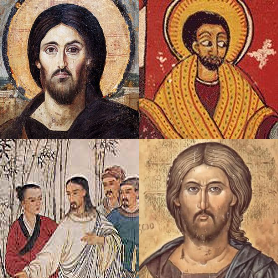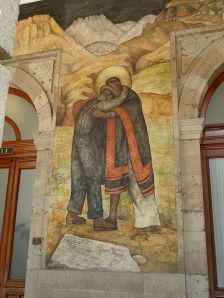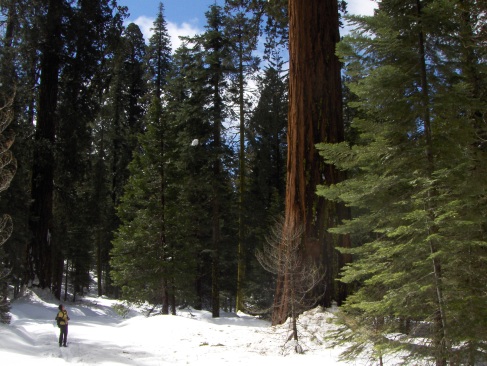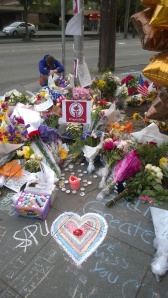 A week and a half ago, the impossible happened. The shooting at SPU totally blindsided our campus community, thousands of alumni, and our neighbors in Queen Anne, Seattle, and the whole region. It wasn’t that we hadn’t been prepared for such a possibility. On the contrary, SPU was praised for its quick response to the situation as it unfolded and its preparedness. But we never really thought this would happen. Even as I sit here writing this in the comfort of my home, I can see the horror of the situation unfolding when I let my thoughts wander down to campus, the memorial, and the slate gray sides of Otto Miller Hall, now seeming to rise ominously toward the sky. Much has been written about the events that unfolded, and many have written more eloquently than I will. However, there are a few persistent thoughts that keep running through my head about how grief has unfolded, and I need to write them down.
A week and a half ago, the impossible happened. The shooting at SPU totally blindsided our campus community, thousands of alumni, and our neighbors in Queen Anne, Seattle, and the whole region. It wasn’t that we hadn’t been prepared for such a possibility. On the contrary, SPU was praised for its quick response to the situation as it unfolded and its preparedness. But we never really thought this would happen. Even as I sit here writing this in the comfort of my home, I can see the horror of the situation unfolding when I let my thoughts wander down to campus, the memorial, and the slate gray sides of Otto Miller Hall, now seeming to rise ominously toward the sky. Much has been written about the events that unfolded, and many have written more eloquently than I will. However, there are a few persistent thoughts that keep running through my head about how grief has unfolded, and I need to write them down.
First, grief is unpredictable. It is only in the last few days that my emotions seem to have truly stabilized, but even then, grief can sneak back in when I least expect it. It comes back in waves, thought they are less frequent now, and can be triggered by a concentration of sirens near campus, or the dull thud of helicopter blades hovering overhead. And perhaps the grief will never fully go away. But in any case, healing has begun. It is also hard to predict who grief will affect. Since the shooting, I have run in to many friends, alumni from the past 2-5 years, and have noted how deeply this tragedy affected all of us. We don’t know the victims or most of those who were in the building. We many know a few professors, but some of those I spoke with hadn’t been back to campus since graduation. What made the feelings so acute? Perhaps it was that it is hard (impossible?) to go four years at SPU without a class in Otto Miller, even if it’s a gen ed class. When I read the news reports, I could see the scene unfolding in my mind. I know that lobby, those chairs, the lines of brick and carpet and white walls now stained with blood. Or perhaps it was the formative legacy of an SPU education. College changes you, and SPU is especially interested in fomenting change in its graduates. It becomes like home, and our identity gets tied up with the professors, those students taking classes we once took, and maybe even the buildings, sidewalks, trees, and lawns. In any case I soon discovered trying to predict where grief would arise in myself or others was unproductive. Much better to react with grace and compassion once it did arise.
Second, grief can seem to lack a sense of scale. This can certainly be seen in the reactions of my friends to the shooting. Many seemed to question if they even had a right to feel so shaken, given what in some cases was a few years of distance from their time as a student at SPU. But everything in me pushed me to affirm their grief. Why should they not have a claim? Additionally, the number of lives lost doesn’t necessarily correspond to the grief we feel. The same day as the shooting, June 5, the radical Islamist group Boko Haram killed at least 200 people in villages of north-east Nigeria. Days later, they kidnapped an additional 20 women. And yet I lacked emotional capacity to feel the loss. It seemed distant, isolated. Then last week, I learned of another shooting in Troutdale, OR. That one weighed heavily on my heart, but I still was able to bounce back more quickly. Why, when the death of one student and injury of two others here had rocked me so deeply? There was something deep-seated that was personally troubling about the shooting. Even seeing friends going back to normal on Facebook felt like another violation. I wanted to scream, “don’t you remember what happened? That was just a few days ago! How can you forget so quickly?” And yet my own reaction to the actions of Boko Haram and quick recovery after the shooting at Reynolds High would seem callous to one closely affected by those tragedies.
Jamie offered wise words when I voiced this problem to him. He suggested that there are two mistakes we can make here. One is to ignore the crises in Nigeria and elsewhere in favor of attending solely to those needs that seem to directly affect us. The second is almost its opposite, to deny our feelings about SPU because more people were killed elsewhere, or to feel shame for the way we feel. Instead, there might be a middle way, or multiple middle ways, that affirm our feelings about the tragedy close at hand while also spurring us on to action, or at least feelings of concern, for the tragedies abroad. I think this is exactly right. Scale cannot be crudely labeled by the tally of lives lost. It is necessarily personal and subjective, and we can affirm that. However, we can also affirm the desire to care and make sense of the pain around the world. It cannot all be personal – that would be paralyzing. But we can at least move forward and be compelled to act.
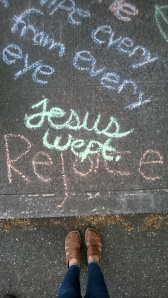 Finally, grief is often mixed with many other emotions. I don’t think I know a single person whose reaction to the incident could be solely labeled as grief. Many of us felt the things you might imagine: anger, fear, horror, and even despair. On the other hand, there were the much lauded response of the campus community coming together to pray, lament, and remind one another of our hope in Christ. It felt natural and right, the mix of feelings as we worshiped and prayed together, and it was beautiful. And again two or three days after the shooting, I found myself able to think about other things without the tragedy hovering overhead, and soon laughter could be seen around campus again. It wasn’t that the grief was disingenuous, simply that one cannot go on grieving indefinitely or without respite. And of course, there was numbness. Numbness often feels wrong, like it is a betrayal of what happened, but it is real, and even expected after expending so much emotional energy. The first week felt like a roller coaster for me and for many others I talked to. However, there was comfort in riding it together.
Finally, grief is often mixed with many other emotions. I don’t think I know a single person whose reaction to the incident could be solely labeled as grief. Many of us felt the things you might imagine: anger, fear, horror, and even despair. On the other hand, there were the much lauded response of the campus community coming together to pray, lament, and remind one another of our hope in Christ. It felt natural and right, the mix of feelings as we worshiped and prayed together, and it was beautiful. And again two or three days after the shooting, I found myself able to think about other things without the tragedy hovering overhead, and soon laughter could be seen around campus again. It wasn’t that the grief was disingenuous, simply that one cannot go on grieving indefinitely or without respite. And of course, there was numbness. Numbness often feels wrong, like it is a betrayal of what happened, but it is real, and even expected after expending so much emotional energy. The first week felt like a roller coaster for me and for many others I talked to. However, there was comfort in riding it together.
I have the good fortune to have experienced personal losses precious few times in my life, so even though the shooting at SPU was not the first time I’ve experienced a longer period of grieving, everything still feels very fresh. For that reason, these observations all felt very new to me, even if they might seem like tired old cliches to some. I am grateful that I was on campus during and after the tragedy, for I was able to mourn with the community, learning from and supporting one another. My hope is that these experiences are carried forward for all those of us affected so that when crisis next strikes – and it surely will for each of us – we are better prepared to weather the storm.



